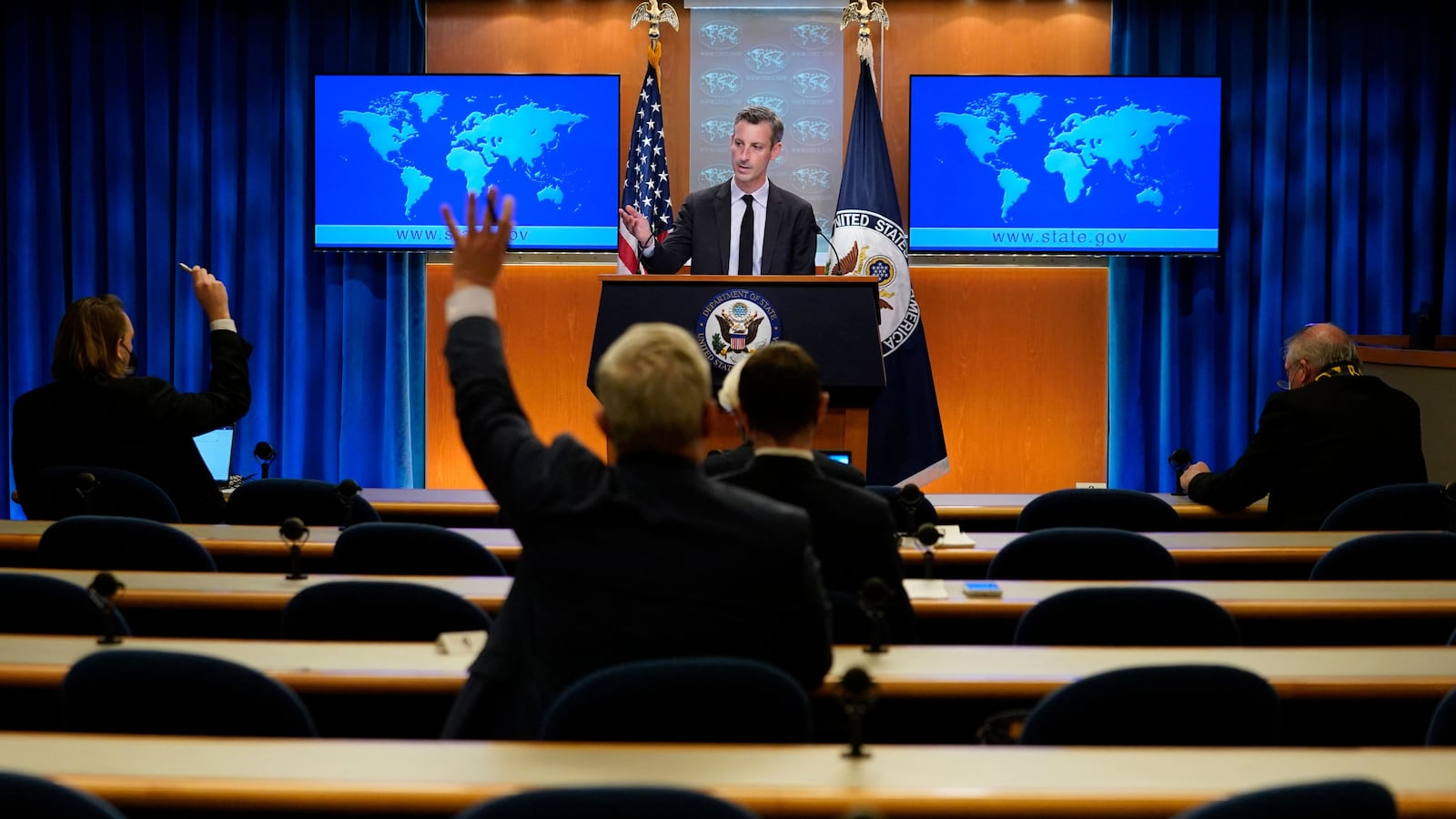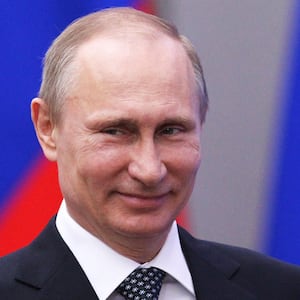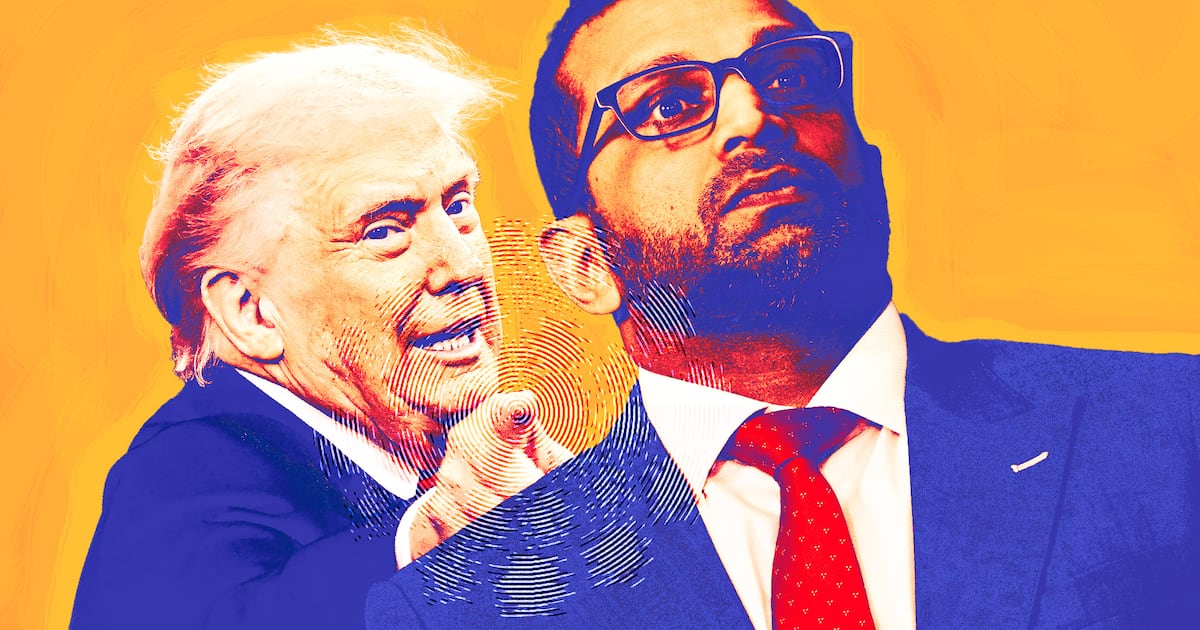George W. Bush famously mangled an old proverb, by saying: “Fool me once, shame on you. Fool me, you can’t get fooled again.” With apologies to Dubya (and The Who), the Associated Press’s Matt Lee is determined he won’t get fooled again.
During a Thursday press briefing, Lee grilled State Department spokesman Ned Price over U.S. intelligence assertions that Russia is planning a false-flag operation as “a fake pretext to initiate and potentially justify military aggression against Ukraine.”
Responding to the assertion that Russia is developing a propaganda video with “crisis actors pretending to be mourners,” Lee jibed, “This is like Alex Jones territory you’re getting into now.”
When Lee asked for evidence, Price, who seemed rattled, suggested that his mere press briefing constitutes proof. “Well, where is it? Where is the declassified information?” Lee asked. To which Price replied, “I just delivered it.”
Price condescendingly suggested he could print out a transcript of his comments, as if that would constitute delivering the receipts.
But Lee wasn’t backing down. “I remember WMDs in Iraq,” Lee said. “And I remember that Kabul was not gonna fall…”
Then—under pressure from Lee’s relentless questioning—Price went too far, saying: “If you doubt the credibility of the U.S. government, of the British government, of other governments, and wanna, you know, find solace in information that…the Russians are putting out, that’s for you do to.”
You heard that right. Price all but accused Lee of parroting Russian propaganda. For those hoping for a “return to normalcy,” it was one step short of referring to an AP reporter as an “enemy of the people.” But only by a little.
Now, when it comes to standing up to Putin, I’m basically a hawk. And yes, it’s true that there are dupes who can end up spouting Russian talking points (see Donald Trump). But that’s not what this was.
This was an experienced journalist from a non-ideological media outlet who was rightly asking skeptical questions (of a Democratic administration), the answers of which the American people have a right to know. This is exactly what we should want a free press to do, and Lee was attacked as a result. No good deed goes unpunished.
Lee is not pictured in the video, but he sounds reasonable, if skeptical. Price, by contrast, is visibly evasive and defensive. I’m not convinced that he entirely believes what he’s saying.
Don’t get me wrong. It’s entirely possible—maybe even likely—that if Russia invades Ukraine, they will generate some bogus pretext. But is the U.S. merely floating a plausible theory (to preempt or deter an attack), or do we actually have proof that Russia is currently planning such an attack?
Maybe the government does, and maybe it doesn’t.
As Lee said during the exchange, “I’m not saying that they’re not [planning a false flag], but you just come out and say this and expect us just to believe it without you showing a shred of evidence that it’s actually true…”
Americans have plenty of reasons to distrust intel and the so-called “experts.” We have been misled multiple times in recent history, as Lee notes.
Let’s take Pentagon press secretary John Kirby, for example, who also advances this exact same assertion. Kirby is the same guy who, last August, claimed that Afghanistan’s capital city “Kabul is not, right now, in an imminent-threat environment.”
Kirby’s proclamation lasted about 48 hours.
Now, maybe the Biden administration had faulty intelligence. Or maybe they were wish-casting—hoping that Afghan security forces would be willing to sacrifice their lives in vain just long enough for us to retreat without bloodshed or embarrassment. Or maybe they rationalized that fibbing served the greater good. I’m not sure. But they were wrong. Again. And at some point, we in the media have to stop being so credulous. Governmental officials and press flacks are asking us to take them at their word—without evidence—and they are suggesting that skepticism is somehow unpatriotic.
I want to live in a world where you can believe what the government tells you, but as Ronald Reagan put it in an adaptation of a Russian proverb, “Trust, but verify.”
We’re not even two decades removed from the U.S. invasion of Iraq, which was justified by bad intelligence rammed down the throats of a credulous media by an administration that also questioned the patriotism of skeptics. Have we learned nothing?
It’s perfectly reasonable for the Biden administration to not want to compromise “sensitive sources and methods” by disclosing classified information. On the other hand, the government (no matter which party is in the White House) could use that argument to justify making any unverified assertions, without providing proof.
But most importantly, government officials owe us something more than their word—especially when this intel could be used to justify a military buildup against a nuclear-armed nation with the capacity to start World War III.
This evasiveness is becoming a habit. Also on Thursday, White House press secretary Jen Psaki pushed back at a reporter who wanted clarity regarding a raid in Syria that killed an ISIS leader, as well as civilians. Psaki implied that merely asking questions meant the reporter believed that ISIS would provide more-accurate information.
The American people have been misled (intentionally or not) too many times. Questioning authority is not unpatriotic; it is, by definition, patriotic.
Kudos to Lee for holding the Biden administration’s collective feet to the fire. And shame on the Biden administration for casting aspersions on his motives.








